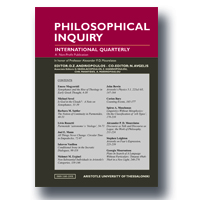|
|
|
1.
|
Philosophical Inquiry:
Volume >
31 >
Issue: 3/4
Gerard Casey
"Which is to be Master?"-The Indefensibility of Political Representation
abstract |
view |
rights & permissions
| cited by
Government, the systematic exercise of command by some over others backed by the allegedly legitimate use of violence, requires justification. All government is predicated upon a distinction between rulers and ruled. Who should occupy the position of ruler and who the position of the ruled is a perennial problem. In thecontemporary world, representative democracy is the only plausible contender for the role of justified government. The key to the justification and popularacceptance of democracy as a (or the) legitimate form of government is the idea of representation, the idea being that in a representative democracy, the people,in some way, rule themselves and thus bridge the gap between the ruler and ruled. However, if a satisfactory account of representation is not forthcoming, thejustificatory status of representative democracy becomes problematic.
|
|
|
|
|
|
|
2.
|
Philosophical Inquiry:
Volume >
31 >
Issue: 3/4
Jan Baton
The Concept of General Theory of Action After Parsons
view |
rights & permissions
| cited by
|
|
|
|
|
|
|
3.
|
Philosophical Inquiry:
Volume >
31 >
Issue: 3/4
Joe Friggieri
Interpretations:
Conflicting, competing, Complementary
view |
rights & permissions
| cited by
|
|
|
|
|
|
|
4.
|
Philosophical Inquiry:
Volume >
31 >
Issue: 3/4
Anna Lehrbaum
Logic and Conflict
abstract |
view |
rights & permissions
| cited by
Analysing conflict from a logical perspective involves the exploration of concepts such as dualism and dialectics. In exploring the ontological determinants- identity and negation - it becomes evident that identity is a process and its essential component is negation. Dualism and the law of contradiction providethe framework that perceives reality as consisting of two irreducible elements or modes. It divides an entity into its extremities by denying its unity and creates aninsurmountable gap preventing the disparate components, principles or thoughts f r om being harmonized. In other words reality is determined by polarization, i.e. good-evil, true-false, right-wrong. I am suggesting that using the logic of dualism as a method to approach conflict will necessarily be one-sided. It seems to be the case that a dialectical understanding of reality provides the means for dealing with negation in a non-existential manner, that is to say it opens the sphere of dialogue. A principle that recognizes reality as contradictory establishes an identity that holds in itself negation and affirmation as distinguished entities that claim successfully their existence as components of a unity. Hence within contradiction the perspective of both being and non-being is explored thereby providing the ideal starting point for conflict resolution.
|
|
|
|
|
|
|
5.
|
Philosophical Inquiry:
Volume >
31 >
Issue: 3/4
Eleni Gemtou
Analogies, Metaphors and Models in Art and Science
abstract |
view |
rights & permissions
| cited by
Analogy, as the connection of similar things, is present in all fields of human thought. Art uses verbal (in poetry, literature, art criticism) and optical analogies(in the visual arts), aiming at an emotional perception and interpretation of the world. Philosophy and the sciences also use largely analogical applications, as ameans to construct intuitionally understandable theories. In Law the analogical application of laws is an efficient way to regulate social conflicts. The risk,however, of cognitive distortions, by transferring inadequately explanatory models to other fields, created doubts about the rational appropriateness of suchmethodological tools. Applications of analogical thinking in different domains are readily comprehensible, if the role of analogies in each of them is analysed. Thedifferent aims of science, philosophy and art imply different similarity-criteria to support the transfer of linguistic and visual expressions in regions to which theydo not have a direct connection and application.
|
|
|
|
|
|
|
6.
|
Philosophical Inquiry:
Volume >
31 >
Issue: 3/4
Renia Gasparatou
Moore and Wittgenstein on Common Sense
abstract |
view |
rights & permissions
| cited by
Philosophers often invoke some sort of consensus in order to justify their analyses on knowledge. Such an appeal could be interpreted as a plea for common sense. Yet there are many senses of common sense. In this paper, I would like to explore G.E. Moore and L. Wittgenstein's appeal to such a folk consensus. I will argue that while the former attaches common sense with the everyday beliefs of plain men, the latter invokes the universal norms underlying human practice and therefore invites an ideal common sense that can better serve as an epistemic criterion.
|
|
|
|
|
|
|
7.
|
Philosophical Inquiry:
Volume >
31 >
Issue: 3/4
Christos Y. Panayides
Aristotle and the Early Megarians An Interpretation of Metaphysics Θ. 3
view |
rights & permissions
| cited by
|
|
|
|
|
|
|
8.
|
Philosophical Inquiry:
Volume >
31 >
Issue: 3/4
Ramón Román-Alcalá
Pyrrho of Elis and Indifference as Therapy from Philosophy
view |
rights & permissions
| cited by
|
|
|
|
|
|
|
9.
|
Philosophical Inquiry:
Volume >
31 >
Issue: 3/4
Penelope Tzioka - Evangelou
The concept of Ideology in the Political Philosophy of Aristotle
view |
rights & permissions
| cited by
|
|
|
|
|
|
|
10.
|
Philosophical Inquiry:
Volume >
31 >
Issue: 3/4
Chryssi Sidiropoulou
St. Anselm's Ontological Argument:
Riddle or Game?
view |
rights & permissions
| cited by
|
|
|
|
|
book review |
|
11.
|
Philosophical Inquiry:
Volume >
31 >
Issue: 3/4
Anastasia Marinopoulou
Edgar Grande:
Cosmopolitan Europe
view |
rights & permissions
| cited by
|
|
|
|

